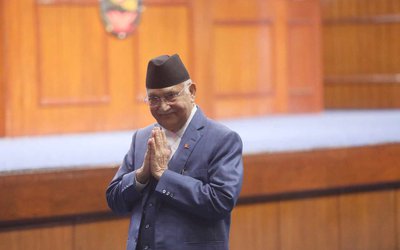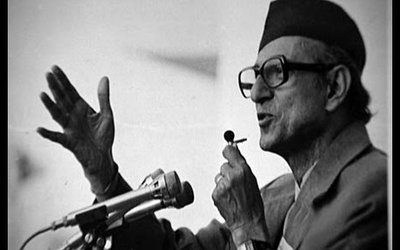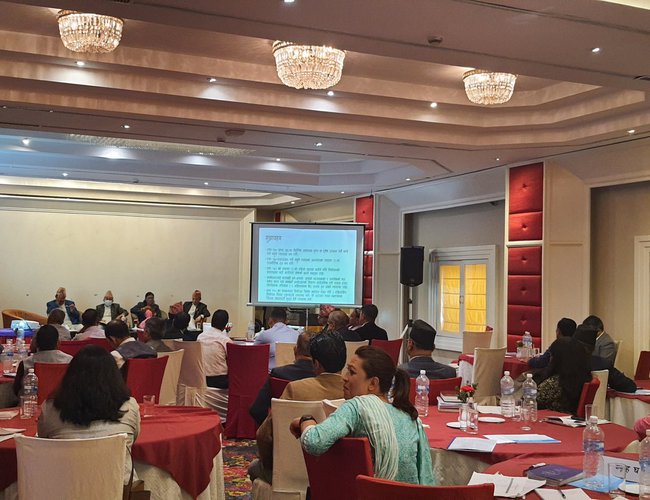
Just four months away from the proposed elections for the House of Representatives and Provincial Assemblies, the Elections Commission has just started an interaction with various stakeholders on a draft of the Integrated Election bill which aims to strengthen the Election Commission to implement the compliances.
After recommending November 18 as the date for the elections of national and provincial parliaments, Elections Commission has kicked off the elections process to fulfill its own election compliances.
As the government is now consulting with political parties and other stakeholders to finalize the date, the election commission kicks off the implementation of its primary compliances like voter registrations and distribution of voter ID, purchasing of voting machines and so on. Similarly, the commission has also started the discussion on the implementation of the code of conduct.
Although various stakeholders have been urging to bring the integrated elections act to ensure free and fair elections for a long, Election Commission has finally introduced the draft for broader discussion.
In a recent interaction program chaired by Chief Elections Commissioner Dinesh Kumar Thapaliya and attended by all five Election Commissioners and various stakeholders from NGOs, the commission presented a draft of the Integrated Elections Bill.
“Given our experiences of concluding recent local elections, we have realized a need for an integrated elections law which will further strengthen and consolidate the elections process ensuring voters’ rights,” said Chief Elections Commissioner Thapaliya. “This proposed draft will address the visible shortcomings in holding the free and fair elections.”
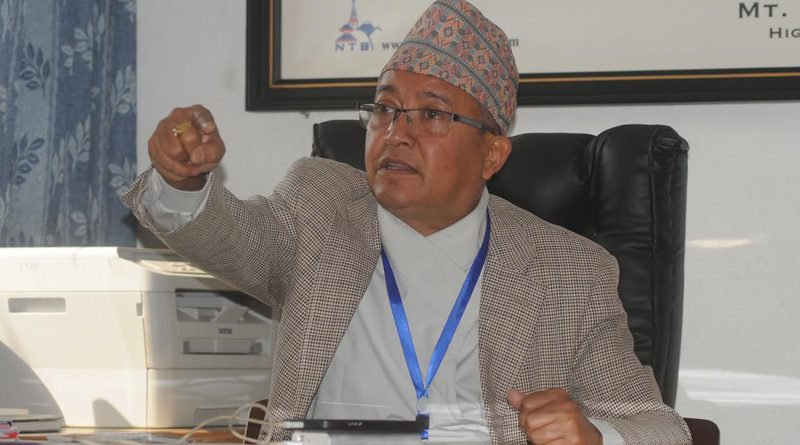
Following a series of discussions, the commission will submit the draft to the Ministry of Home Affairs to register in the parliament. “We want suggestions from local NGOs working in safeguarding the elections systems and other agencies to have a role in the elections.”
Leading NGOs activists also shared their views. “Although it is still in the drafting stage, the proposed draft covers a broader area and there are places to add. We have been demanding an integrated elections act for a long. This is the right step of the commission,” said Krishna Man Pradhan, Chief Executive Officer of Nepal Law Commission.
Some argue that the time is too short and too late compared to the work Commission needs to complete for the draft. Besides, the process of passing the draft will be lengthy because the draft involves many sensitive and complex legal issues.
“At a time when there are several acts scattered here are there, the draft presented by the commission for integrated elections act is an appropriate step to bring an Umbrella Act,” said former minister and law secretary Madhav Prasad Paudel. “The time is too short but this is the right time to present this kind of draft to the public.”
Elections Commission In Hurry
As the proposed date for the national and provincial election is merely four months away, the commission has a long list for shopping. From voter registration, and corrections, to choosing ballot papers and entire issues of elections management including booths, distances, type of machines, and security arrangements, the commission has to complete Hercules task in the coming four months
The issue of rights to vote for Non-residential Nepali and arranging booths for such voters is a major contentious issue. Members of the ruling Nepali Congress Party have already raised the issue of the right to vote to NRNs. General secretary and members of Parliament GaganThapa have already demanded with the government to introduce an election act amendment bill to give the right to vote to all. “The EC will likely bring a bill with a provision of the right to vote to NRNs,” said MP Thapa.
Similarly, there is a growing demand for the amendment to the political party act with a provision to end the prerogative of political parties to change the serial numbers of the closed list.
However, the process of drafting the bill has just started, and nobody is sure how many important issues the house will incorporate during the discussion on the bill.
As their lack the elections plan, the commission is working in a haphazard manner and rush as in the past. Thus, there will again be surface gaps and in the forthcoming elections as well.
Niti’s Studies
In its series of studies including the latest one, the Niti Foundation, a Nepali non-profit organization engaged in strengthening Nepal’s policy process through collaborative research, innovative policy adoption, and enhanced policy choice, comes out with a number of important suggestions and recommendations to ensure the free and fair elections and make Commission as a strong institution with a capacity to implement compliances.
“Election commission needs a guideline to guarantee free and fair elections. These guidelines show procedures for the elections like kind of stamp, types of ballot papers E- ballot or paper, the color of ballot and materials used for the polling station. Although these are general issues, they can make a difference. For successful management of elections the EC needs a guideline,” said Mohan Das Manandhar, CEO of the Foundation.
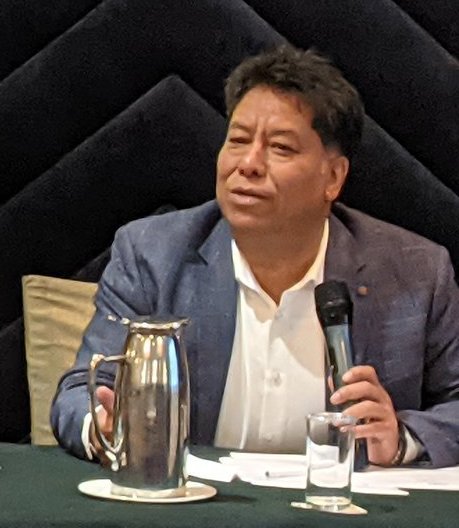
In its recent Niti Notes tittles Placing the Strengthening of Democracy at the Heart of the Election Commission’s Agenda, imminent constitutional lawyer Professor Dr. Bipin Adhikari has come out with a detailed discussion on various aspects of the elections and the compliances of the commission itself and compliances for other actors including the political parties. The report, which discusses accountability, elections process, procedures and roles of different actors, is very much relevant in the present context.
CEO Manandhar argues that compliance is a key issue all the time. He suggested that the commission should ask all political parties to appoint a compliance officer to look the issue. “EC has compliance indicators related to political parties and democracy but the commission needs to implement them to make political parties democratic. Just holding the election periodically is not enough for democracy but what is required is a frequent intervention and interaction with political parties,” said Manandhar.
Financial compliance is one of the most important ones. Under this, EC can force political parties to present their audited report annually and update accounts. “As per the political party act, an elected MP has to publish his personal asset before taking any position in the government. Submitting the personal asset to the commission is compliance imposed on the candidate. As per the act, political parties and their candidate have to submit their audited financial report to the commission. Election Commission has to enforce this compliance as per the act,” said Manandhar.
Compliance related to closed lists needs to be implemented in its spirit and words. “The commission should not allow political parties to amend the close list for proportional representation once it is submitted to the commission. “Political parties have been changing the priority on the basis of their own interests. Political parties should not be allowed to play the name list once it submits as a closed list. “As per the law and constitution, the parties have to restructure their party organizations. EC must take action and give direction to those parties which do not abide by it. According to Elections Act and Political Party Act, EC is in a position to force parties to follow the compliances. The findings of Niti also showed that effectiveness and enforcement of Elections commission are highly important to democratize the political parties and democracy,” said Manandhar.
The commission also needs to regulate the words used in the preamble of the constitution of the political parties. As per the acts, political parties should not be allowed to write words and statements against the spirit of the law and the constitution.
“The commission should not allow any political parties to write in their preamble like the statements for restoration of constitutional monarchy and establishment of a one-party state. Both are against the constitution and law,” said Manandhar.
“Implementing compliance is an important part to make the democracy successful. Democratic should be rule-based. EC should take necessary steps to force political parties to follow the letter and spirit of law and constitution. The word like armed rebel and restoration of monarchy should not be allowed to use in the preamble of any political parties,” said Manandhar.
As an institution to make other bodies accountable, EC needs to be accountable first. “The commission must have guidelines on how to go to people, how to announce the elections, how much money it wants how many cars it wants The most important issues are related to the votes. Voter education and electoral mechanisms are highly important parts. For this, the commission needs to launch voter education all the time,” said Manandhar.
Voter education is a complicated issue and cannot be launched in four months. It will require years of effort. Democratic strengthening means voter strengthening. Thus voter education is a highly important part of EC.
In recently concluded elections, the number of invalid votes was alarmingly higher because of a lack of voter education programs. This will repeat in coming elections as well in absence of voter education.
To strengthen the elections, the Commission must make rules for itself. The federalization of EC is one of the important works. The commission has already established officers in provinces but it still relies on district officers.
“As per the current federal constitution, the election commission also needs to function as a federal entity. However, the commission is still a centralized entity and its programs are centralized. EC must launch voter education and other election-related programs in close collaboration with local levels and province-level governments,” said Manandhar. “Strengthening the democracy is also strengthening the political parties. It is the duty of the EC to strengthen the political parties. For this, EC needs to be democratic, federalized and accountable and transparent in its all activities.
Along with the election monitoring, Elections Commission needs to monitor the elections process regularly. After conducting the elections, EC needs to engage and be involved in the entire processing of political parties. The Commission has a big role to play to make political parties accountable and strengthen the governance of political parties.
Highlights of Note
As there do not have election policy, EC has been facing several problems at the matter related to pre-election preparations and post-election scenarios.
“Nepal does not have a national election policy. Without this, a holistic approach to elections management is not possible,” said Dr. Adhikari. A national election policy will be a major instrument to strengthen democracy. ”This will enable the ECN to focus on elections during the election year and, according to national policy, spend the rest of the time on democratic consolidation. This includes focusing on issues such as the protection of electoral integrity, continuous evaluation of electoral standards, working with interest group organizations — non-governmental organizations, media, and law enforcement agencies — for strengthening electoral democracy, working with relevant public or private institutions for the propagation of values that help improve the socio-economic equality, developing a sense of tolerance and respect for each other, creating a sense of accountability, and actively participating in political affairs.”
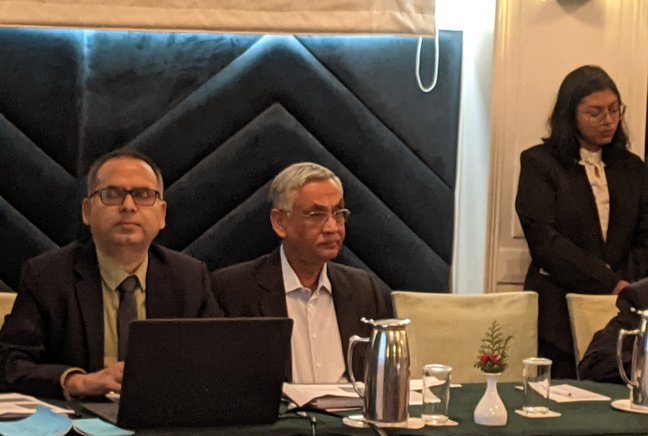
“Election management bodies, such as the ECN, are important actors for the promotion and protection of democracy in any democratic nation. It is, therefore, critical to consider the ways in which the ECN can promote and further strengthen democracy beyond the exercise of a free and fair electoral process,” writes Dr. Adhikari.
“In any democracy, elections are the key to a competitive, plural political system. By exercising adult suffrage, the sovereign people of a democratic country establish their government and institutionalize democratic and accountable governance. It is for this reason that elections are led and conducted in every democratic country by (usually independent) electoral bodies or other such institutions that may accomplish this job independent of the influence of the incumbent government.”
Areas for Policy Reform and Policy Implementation
The election is a complex and lengthy process that involves voter registration, transfers, voter ID distribution, printing ballot and so many others. “The necessity of independent EMBs for democratic consolidation has been established through the argument in Chapter Two. The argument further makes the case that EMBs should not be limited to performing mere technical roles, but that they should also participate in substantive aspects of democratic consolidation. The analysis has explored the ECN’s case and how the Constitution and the electoral legislative framework provide normative orientation for the Commission to work in the broader arena of democracy protection and promotion. The legal and normative space for the ECN to perform its technical and normative role vis-à-vis electoral administration is a prerequisite but not a sufficient condition for the Commission to effectively execute its mandate of electoral administration and support Nepal’s democratic consolidation. This is because having legal and normative space does not imply that the space is utilized effectively. This might be due to the Commission’s own inefficiency or constraints put on the Commission by other stakeholders (e.g., government and political parties). Through the elections held in 2017 and 2018 under the new Constitution, the ECN experienced the new Constitution and electoral legislation under it. The ECN reviewed these elections in consultation with various stakeholders in 18 thematic areas. The objective of the review was to document the lessons learned from the recent elections and to gather recommendations for improving electoral processes in the future. The review focused on elections, but not on the larger democratization perspective. Upon review of the foregone elections and the ECN’s experience, the ECN needs to consider different aspects to better exercise its legal and normative space, and support the consolidation of democracy in Nepal,” writes notes.
The note suggests several policy issues the Elections Commission needs to take. These include: Creating a National Election Policy, Streamlining Existing Laws and Procedures, Reforming the Political Parties Act 2017, Ensuring Constant Coordination between the ECN and Political Parties, Ensuring Constant Coordination between the ECN and Political Parties, Implementing Standard Electoral Dispute Resolution Procedures, Regulating and Monitoring Campaign Finance, Providing Regular Civic Education beyond Technical Voter Education and Fostering Inclusion and Participation in Electoral Systems and Processes.
Similarly, Providing Voting Rights to Non-resident Nepalis, Incorporating a NOTA Option and Other Areas for Reform.
Out of 13 constitutional commissions, Election Commission is one of the active commissions exercising its constitutional roles and duties.
In its two studies entitled Strengthening Constitutional Bodies for Democracy and Constitutionalism and Strengthening Election Commission in the Regulation of political parties, Niti Foundation highlighted functional and organizational lapses in protecting and promoting marginalized and oppressive community and their representation in state affairs.
“There is everything in the constitution and law. However, our problem is still in implementation of compliances effectively by Elections Commission for itself and the compliances set for others by the commission,” said Manandhar, “There are problems in accountability, fairness and justice because of our failure of implementations.”
Although EC has started discussions on a new draft of the Integrated Elections Act, the success of free and fair elections will depend upon its capacity to implement the compliances set by the act.

Keshab Poudel
Poudel is the editor of New Spotlight Magazine.
- HELVETAS NEPAL’S RIVERBED FARMING: Shift From Overseas To Local Farming
- Jul 26, 2024
- POLITICAL SCENARIO : K.P. Sharma Oli's Resurgence
- Jul 21, 2024
- UNDP/MinErgy: An Inventive Approach To Clean Brick Kiln
- Jul 19, 2024
- HELVETAS NEPAL: Nutrition Through Riverbed Farming
- Jul 18, 2024
- NOU Opens To All: Dr. Shilu Manandhar Bajracharya, Vice Chancellor
- Jul 15, 2024

